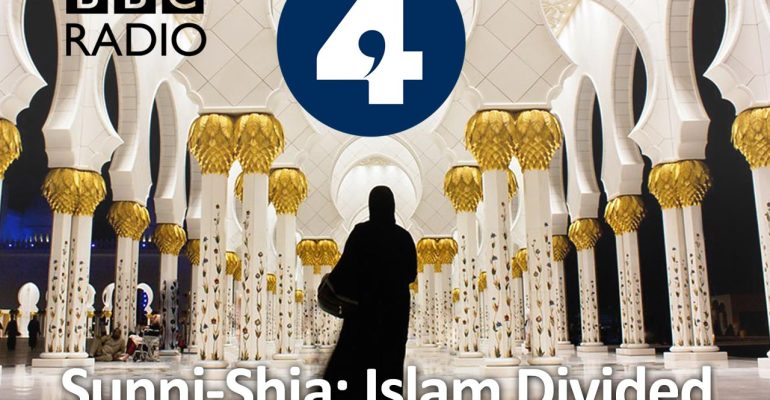BBC Radio 4 Program on Shi’i-Sunni Split
September 25, 2016 2022-06-14 16:34BBC Radio 4 Program on Shi’i-Sunni Split
BBC Radio 4 Program on Shi’i-Sunni Split
- Summary:
- Description:
Producer of the program is Neil McCarthy. In the first of two programs explaining the Sunni-Shia divide past and present, Tarek Osman tells the epic story of how Islam split after the death of the Prophet Mohammed.
Many of the conflicts raging in the Middle East today see Sunni and Shia armed groups pitted against one another and communities that were once a mix of both sects, torn apart.
To understand the origins of the dispute we must go back to the final hours of the Prophet Mohammed and the question of who was going to succeed him as leader of Islam after his death.
[Caption: Islamic Sectarianism Today. Tarek Osman looks at the causes of the Sunni-Shia divide in the Middle East today.]
Two groups emerged claiming to be the rightful heirs of the mantle of Islam: the Prophet’s immediate family who would become the Shia and his closest companions, who became the Sunni.
Tarek follows the dramatic events of the 7th century AD as Islam spread across continents and power struggles ensued. He pauses at Karbala, in Iraq, and the murder of the Prophet’s grandson Hussein, which saw the irrevocable split between the Shia and the Sunni.
[Caption: The Early Split. Tarek Osman tells the story of the Sunni-Shia split in the early years of Islam.]
In the second part of his series on the Sunni-Shia divide, Tarek Osman travels to the Middle East to examine the causes and forces behind the sectarian split today.
Conflicts raging in Iraq, Syria and Yemen all have a sectarian dimension with communities – who used to live side by side – now torn apart. Tarek follows history across the 20th century and the first decade of the 21st to understand how the Sunni-Shia divide has become so entrenched.
He wants to know if the current divisions echo the original split between the Sunni and Shia dating back 1400 years. Or whether sectarianism today is being used by powerful regional players to achieve their own geo-strategic and political goals.
In Lebanon, a barometer of sectarianism in the Middle east, he meets people from both Muslim sects to hear how religious identities are changing; and he visits a Syrian refugee camp to meet people who have been forced to flee their homes because of a war waged along sectarian lines.
Source: BBC
Source:https://www.bbc.co.uk/programmes/b07wr3kx/episodes/guide
- :توضیحات
این مقاله دو پادکست دارد که میان متن قرار میگیرند و کپشن نیز برایشان در نظر گرفته شده است. (این امکان وجود داشته باشد که بتوان پادکست ها را از یک فضای ابری غیر از خود سایت مثل ساند کلود استریم کرد.)
Related Posts
Islamic Seminary of America (ISA)
The Centre for Islamic Thought and Education (CITE)
Canada: Quebec’s Muslim to have their own cemetery
Australian Association of Islamic and Muslim Studies (AAIMS)
“Death threats every day” for woman behind new liberal mosque
Search
Categories
- Academic Centers (104)
- Art & Culture (27)
- Articles (29)
- Books (146)
- Call for Papers (7)
- Dissertations (14)
- Hopes & Challenges (96)
- Innovative Ideas (48)
- Inter-religious Centers (12)
- IRIC News (21)
- Islam & the West Newsletter (7)
- Islamic Centers (12)
- Islamic Institutes (5)
- Islamic Organizations (2)
- Islamic Projects (44)
- Islamic Schools (3)
- Islamic Seminaries (2)
- Islamic World News (891)
- Islamophobia (304)
- Journals (27)
- Media Framing (39)
- Mosques (3)
- Muslim Youth (18)
- News Articles (19)
- Other (33)
- Recent Publications (217)
- Religious Centers (69)
- Reports (91)
- Scholarships (5)
- Success Stories (48)








